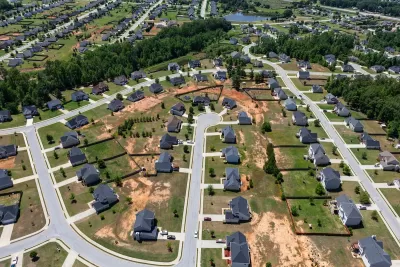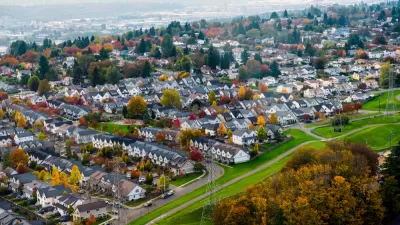How making residential building requirements more flexible can ease the housing crisis and make neighborhoods more livable for more households.

In a piece for Strong Towns, Ben Abramson explains why minimum lot size requirements often stifle new housing development and lead to higher housing costs and a dearth of affordable housing for smaller households.
Advocates for incremental development suggest that cities should adjust their zoning codes to allow for more flexible, affordable development that makes use of existing infrastructure to increase the housing supply, eliminating expensive approval processes whose costs get passed on to buyers. “Enabling a fee-simple transaction lets buyers own the dirt under their property and gives underwriters greater confidence in its viability. The more ways your community can enable builders to develop housing options with fee-simple sales, the faster they can address North America’s glaring housing shortage.”
Portland, Oregon developer Neil Heller says incremental development, such as building multiple housing units or subdivided homes on single-family zoned lots, doesn’t bring about the massive changes some people fear. “Yes, you do notice change, but it's almost imperceptible … the average person just going down the street would probably not even notice what's going on in the backyard.”
Some cities, such as Austin and Houston, have reduced minimum lot sizes as part of zoning reforms to both encourage denser, more walkable development and boost the housing supply.
FULL STORY: How Minimum Lot Size Requirements Maximize the Housing Crisis

Trump Administration Could Effectively End Housing Voucher Program
Federal officials are eyeing major cuts to the Section 8 program that helps millions of low-income households pay rent.

Planetizen Federal Action Tracker
A weekly monitor of how Trump’s orders and actions are impacting planners and planning in America.

Ken Jennings Launches Transit Web Series
The Jeopardy champ wants you to ride public transit.

Washington Legislature Passes Rent Increase Cap
A bill that caps rent increases at 7 percent plus inflation is headed to the governor’s desk.

From Planning to Action: How LA County Is Rethinking Climate Resilience
Chief Sustainability Officer Rita Kampalath outlines the County’s shift from planning to implementation in its climate resilience efforts, emphasizing cross-departmental coordination, updated recovery strategies, and the need for flexible funding.

New Mexico Aging Department Commits to Helping Seniors Age ‘In Place’ and ‘Autonomously’ in New Draft Plan
As New Mexico’s population of seniors continues to grow, the state’s aging department is proposing expanded initiatives to help seniors maintain their autonomy while also supporting family caregivers.
Urban Design for Planners 1: Software Tools
This six-course series explores essential urban design concepts using open source software and equips planners with the tools they need to participate fully in the urban design process.
Planning for Universal Design
Learn the tools for implementing Universal Design in planning regulations.
Heyer Gruel & Associates PA
Ada County Highway District
Institute for Housing and Urban Development Studies (IHS)
City of Grandview
Harvard GSD Executive Education
Toledo-Lucas County Plan Commissions
Salt Lake City
NYU Wagner Graduate School of Public Service





























